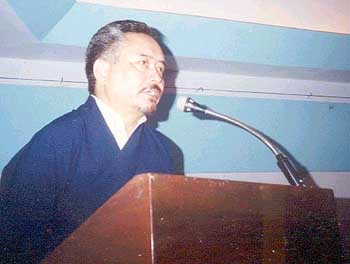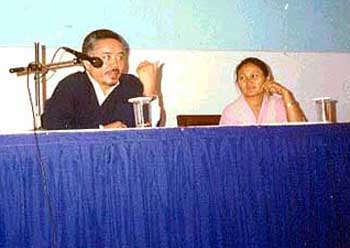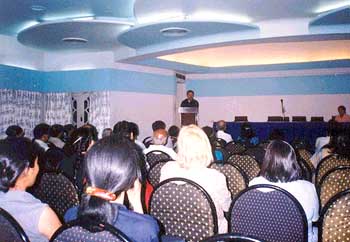'The Tibetan System of Medicine'
(Bombay. April 27, 2002)

Dr Pema Dorje and the 'Tibetan System of Medicine'
On April 27, 2002, Friends of Tibet (INDIA) organised a talk by Dr Pema Dorjee, Senior physician and General secretary of the Men-Tsee-Khang, in Bombay. Held at the MC Ghia Hall on Rampart Row at Kalaghoda, the public lecture was attended by about 100 people, and was an in-depth explanation of the philosophy underlying the 'Tibetan System of Medicine', and also an introduction to some of the techniques of diagnosis and treatment in this system.
The speaker and his colleague Dr (Ms) Tenzin was introduced by Aspi Mistry (Spokesperson, Friends of Tibet INDIA), who also highlighted some of the activities of the Friends of Tibet (INDIA), placing the preservation and development of the Tibetan System of Medicine in the larger context of the protection of the civilisation, culture and values of Free Tibet.
Dr Pema Dorjee began by speaking about the close connection between the Tibetan System and Ayurveda, and their common holisitic approach to the understanding of disease.
'Everything that exists in the universe, is made up of the five elements, earth, space, fire, air, water. If we forget this we move away from nature.' Padmsambhava, in the 7th century AD had already predicted the serious consequences of deforestation, pollution and other man-made problems that would afflict the world in this age, the kalyug.

Dr Pema Dorje and Dr (Ms) Tenzin
'Tibetan Medicine starts with the problem of human suffering', said Dr Dorjee. 'Where does suffering come from? It is self-made coming from ego, selfishness, which in turn come from ignorance.' Ignorance gives rise to desire, anger and close-mindedness. These three are directly linked to the imbalances of the energies of vayu (wind), pitha (bile) and phlegm. For instance without anger there would be no pitha and no possibility of fever (heat). On the other hand desires are strongly connected to vayu.
After explaining in some more detail the role of these three 'doshas' in the human body, Dr Pema Dorjee, presented a brief outline of the methods of diagnosis in the Tibetan System. These include touch, observation, questioning. Examples would be the reading of the pulse, which sometimes appears miraculous to the outside observer, examining the tongue, urine, complexion of the patient. Though this system goes to the root of the problem, symptoms are extremely important as they are the manifestations of the 'tridosha'.
Dr Dorjee then spoke briefly about the difficulties of obtaining herbs and medicinal plants, so much in contrast to the old days in free Tibet, when around each house yard you could easily find some useful plants growing. This neccessitates growing and bringing these ingredients from Arunachal Pradesh, Sikkim and Ladakh.
Dr Dorjee ended his talk on an inspiring and personal note. What is it that a physician should seek?
'If someone asks me my mobile number, I say 'zero'. I am not in that status. But I am one of those persons who are liked by my patients in Assam, West Bengal, Delhi, Bombay... so many patients and so many friends who were my patients.' If there is one thing Dr Pema can look back to, in his over 30 years of practice, it is the happiness and 'job satisfaction' that comes from genuinely relieving the suffering of so many thousands of his fellow human beings.
And finally he gave us in the audience, his prescription for happiness and world peace.
'Smile Three Times A Day'

It was a rare opportunity for the Mumbaikars
CA Kallianpur (All India Coordinator, Friends of Tibet INDIA) then gave the vote of thanks and finally, the doctors from the Men-Tsee-Khang honoured the members of FoT by offering the traditional khatas, which were presented by Jayaben Maheshwari.
'The Tibetan System of Medicine' talk by Dr Pema Dorjee was organised by the Friends of Tibet (INDIA) in Bombay on April 27, 2002